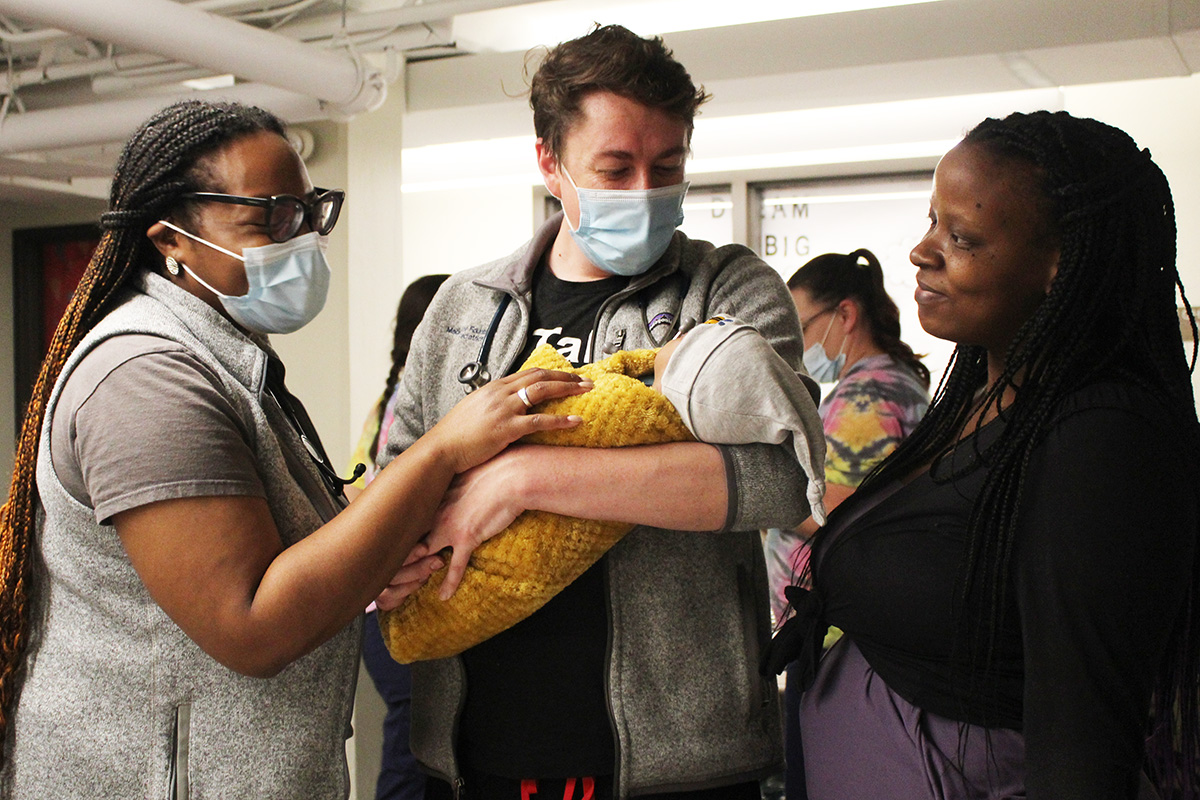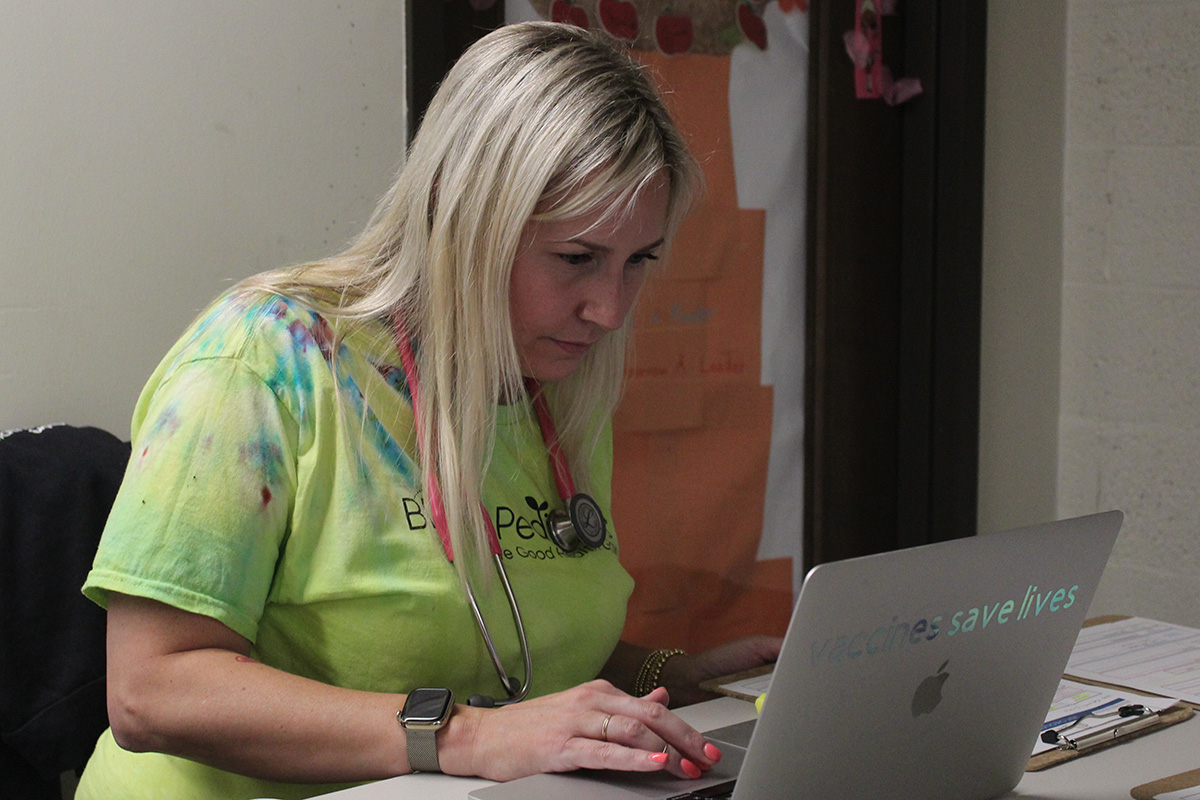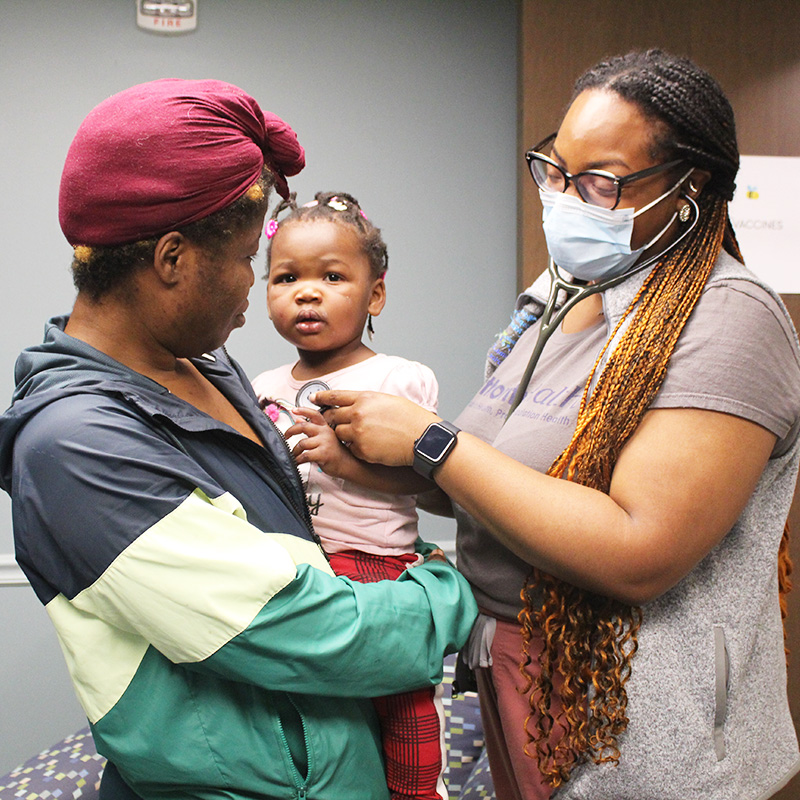Residents Provide Pediatric Care in an Unlikely Place—A Homeless Shelter
 Above (from left): Dr. Dozie Uzoma; Dr. Mackenzie Fountain; mom of newborn held by Fountain.
Above (from left): Dr. Dozie Uzoma; Dr. Mackenzie Fountain; mom of newborn held by Fountain.
Dr. Mackenzie Fountain knew he wanted to be a pediatrician from a young age. While attending the Michigan State University College of Osteopathic Medicine, he volunteered for Spartan Street Medicine in East Lansing, where he provided primary health services for unsheltered people. During that time, he also felt called to serve the homeless. But fortunately, there weren’t children in the streets where he worked.
“We all go into medicine to help people,” says Dr. Fountain. “I wanted to help the community.” He became involved in Community Integrated Medicine, a medical school program that provides volunteer opportunities in community health. Eventually, he was recruited to work with the street medicine program. “You could see the impact you can have on one person… immediate results.” His involvement led to a collaboration with other students to establish the national Street Medicine Institute Student Chapter.
Fast forward to his pediatric residency at Authority Health in Detroit: Dr. Fountain and other pediatric residents established a vaccine clinic for children at COTS, a family shelter that served homeless children. It was here he found a way to connect his interest in serving homeless people with added burden of caring for children.
One day, while engrossed in studying for a major exam, he took a break and went to work at a pop-up clinic for the homeless. It was a few days before Thanksgiving. While providing osteopathic manipulative treatment, he became fascinated with its impact on the people he treated. “It was fascinating how their body reacted after sleeping on concrete.” But more important, the procedure involved touching people. “It helped us build trust. We were doing something by hand… touch.”
Often, he found himself in conversation with his patients. That day, one told Dr. Fountain, “I think I might have an apartment next week…this will be the first time I had a roof over my head for Thanksgiving.” That struck an emotional chord. Suddenly, the stress that Dr. Fountain had been feeling about his exam dissipated. “It was an amazing, humbling experience.” He told the patient, “Thanks for bringing me back to what matters in life… I always think of that experience.
“I knew I wanted to work with kids from fourth grade, but how do I combine these? As much as I love street medicine, they (the physicians) were all internal medicine or adult psychiatrists. This has been my attempt to combine my two loves. I have not heard of anyone trying to help kids who experience homelessness.”
For Dr. Fountain, it felt lucky—even serendipitous— to finally meet Dr. Katie Schafer (pictured below). Dr. Schafer is a primary care pediatrician who established a mobile COVID vaccine clinic during the height of the COVID pandemic and was thrilled to collaborate with the residents at COTS. After hearing that some young children at the shelter would not be able to attend school last October until they received vaccines, she rose to meet their needs. Dr. Schafer and Dr. Fountain have established what has become a monthly pediatric wellness clinic at COTS consisting of preventative care and vaccinations. Together with Dr. Schafer, Dr. Fountain and other pediatric residents (including Dr. Dozie Uzoma, pictured at the bottom) have been helping children and adolescents at COTS, while also providing health information to their parents. It has become a topic for the residents’ scholarly research project.
 Above: Dr. Katie Schafer
Above: Dr. Katie Schafer
“We thought it would be better to have all of us combined in one project than to do multiple small projects… build something that’s sustainable and lasts longer than us,” explains Dr. Fountain. “We are looking at increasing vaccination rates for kids experiencing homeless in an urban shelter by 25 percent.”
The challenge of overcoming vaccine hesitancy involves building trust among patients. A pop-clinic in a homeless shelter where people have only an episodic relationship with caregivers is one of the more difficult environments to build trust. “With this population anyone can expect a large mistrust in the health care system especially if they have had transient homelessness,” according to Dr. Fountain. Many have not had a primary caregiver and have used emergency services for their care.
“By showing consistency—being there for them not only medically, but psychologically, and having a well-rounded approach to health care, even in a pop-up setting, builds one more layer of trust.”
What began as a vaccine pop-up clinic, the service now offers a full range of primary care services, including screenings for hearing, vision, hemoglobin, and lead levels among other procedures. Some families return for regular visits.
The average length of stay for homeless families in shelters is 70 days, according to the National Coalition for the Homeless. Some may stay as long as six months. As a result, Dr. Fountain says some parents return to the vaccine clinic for ongoing care of their children. COTS staff, trained like community health workers, provide a connection between the pediatricians and residents.
Dr. Schafer notes that even though the COTS clinic was meant to serve as a children’s service, she and the residents are called on to advise parents as well. “That has been a very strange outcome. There have been quite a few parents who have come to us asking us questions. We are not adult doctors, but we’d love to help them find one.” In the meantime, they provide clinical advice for addressing immediate needs. “We are working on creating a resource map for these parents in the local area — pharmacies, local department of health, primary care physicians.”
Just to add some color to the visits, Dr. Schafer and her team arrive in a brightly colored van. During the COVID pandemic, Dr. Schafer wrapped a min-van to resemble the “Mystery Machine” featured in the Scooby Do cartoon series, to draw attention to her mobile vaccine efforts. Fondly called The Vaccine Machine it draws attention to these essential outreach efforts. Supporting the residents at COTS was an additional opportunity to continue her urban outreach, where she had previously provided hospital care at Children’s Hospital of Michigan. She has been a close colleague of Dr. Chaya Pittman-Hunt, who also works at Children’s Hospital and serves as associate director of Medical Education and Pediatrics Program Director for Authority Health’s graduate medical education program.
“I have an interest in helping Detroiters,” Dr. Schafer says. “During COVID everyone felt helpless. We were thrust in an (uncertain) environment. I was very eager to being part of the solution.” Her vaccine initiative provided over 27,000 COVID vaccines in Metro Detroit.
“We were reaching people where they were. When this idea came up, Dr. Pittman-Hunt knew we had experience going out of our office to do this.” From Dr. Schafer’s perspective, she wanted to know how to continue her mobile outreach after the acute phase of the pandemic ended. By mobilizing the resources of her private practice – nurses, medical assistants, administrative support staff — together with the residents, she believes there is great potential to make an impact on child and family health.
“We never know how many kids we will see.” The pop-up clinic has seen as many as 13 children in a three-hour period. “It’s really awesome. We’re grateful for being part of it. These children are way behind in their immunizations.”
While this is about community service, the residents gain unique exposure to how a pop-up clinic can serve an episodic function in the health care safety net. “They’re able to see what we do in a crisis schematic — you really get a sense of what preventative screening is like. Several of these kids have very poor visual acuity but they haven’t seen a doctor to diagnose it. The residents are able to get hands on experience about the importance of preventative care.”
“I have a soft spot in my heart for this population of patients. I’m always trying to find my way back to caring for kids who are less fortunate.”

 Above: Dr. Dozie Uzoma with mom and baby
Above: Dr. Dozie Uzoma with mom and baby